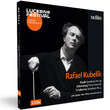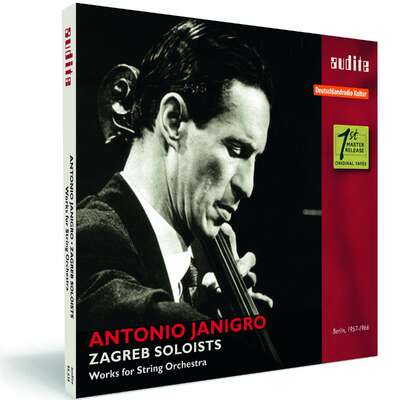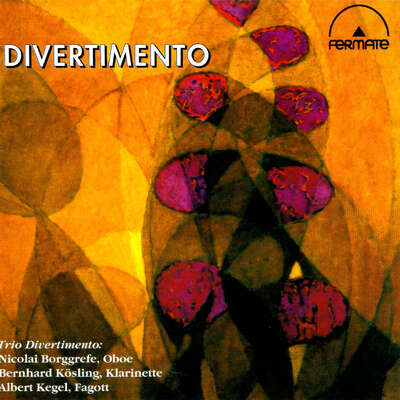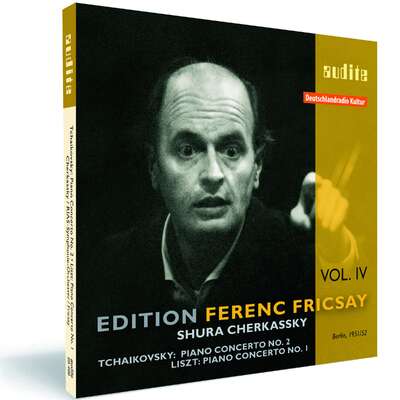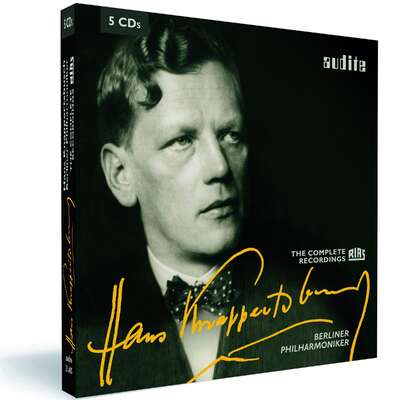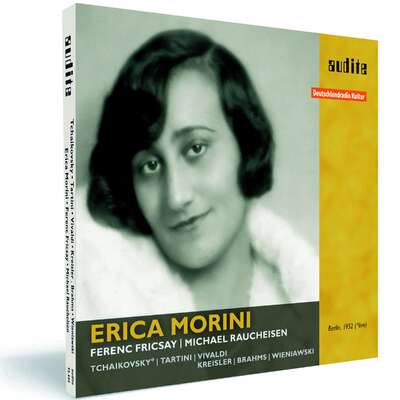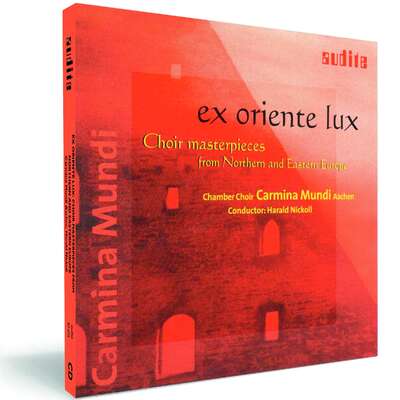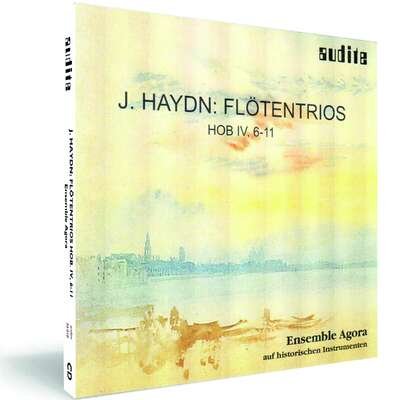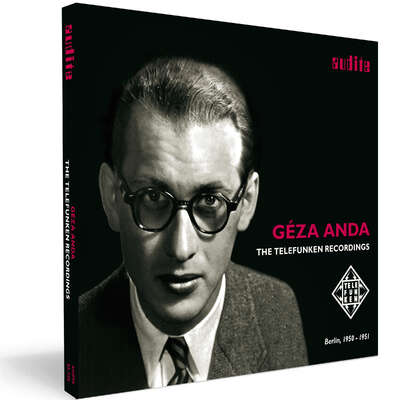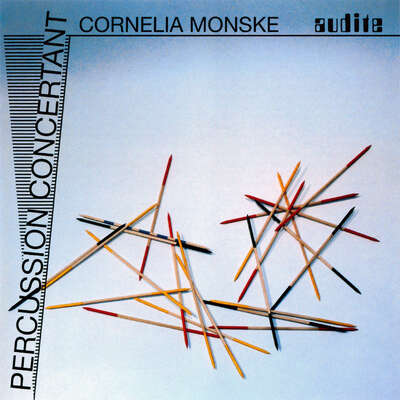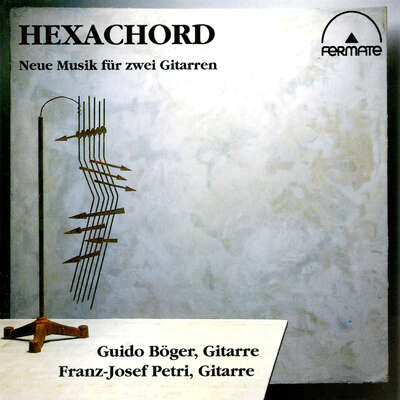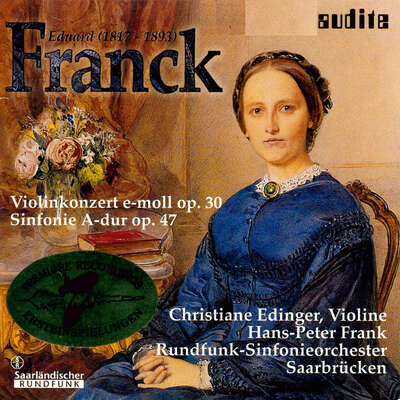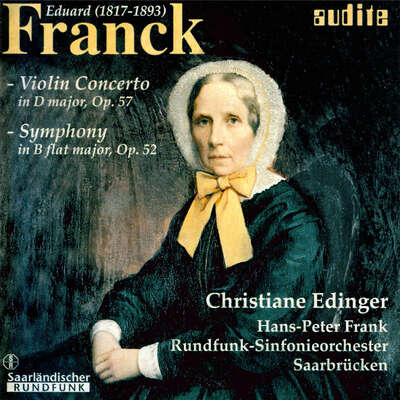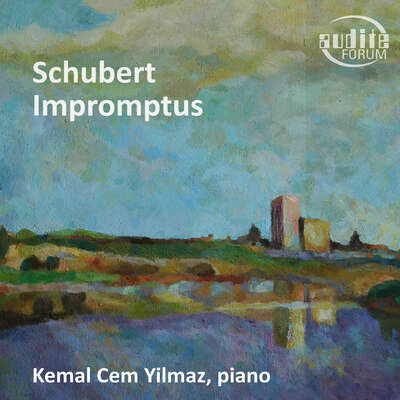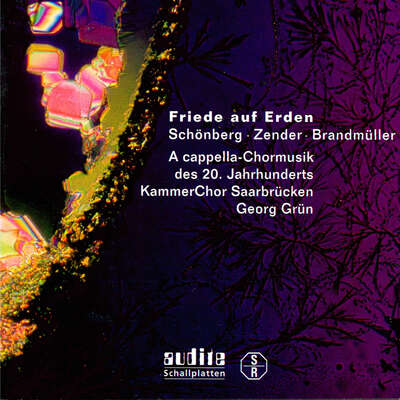
Auto-Rip
Im Sommer 1968, wenige Tage nach der brutalen Niederschlagung des «Prager Frühlings», dirigierte der Exil-Tscheche Rafael Kubelík in seiner Wahlheimat Luzern ein packendes Konzert: Eine vital musizierte Haydn-Sinfonie und eine leidenschaftlich glühende Vierte von Tschaikowsky rahmen Schönbergs Klavierkonzert – zugleich der einzige Auftritt der britischen Klavierlegende John Ogdon bei Lucerne Festival.mehr
"Tchaikovsky ist wohl kaum je intensiver [...] und persönlicher erklungen als damals in Luzern. [...] Wahrhafter kann Musik und deren Interpretation nicht sein." (Online Merker)
Titelliste
Details
|
Rafael Kubelík conducts Haydn, Schoenberg & Tchaikovsky
LUCERNE FESTIVAL Historic Performances, Vol. 18 |
|
| Artikelnummer: | 95.745 |
|---|---|
| EAN-Code: | 4022143957450 |
| Preisgruppe: | BCA |
| Veröffentlichungsdatum: | 2. September 2022 |
| Spielzeit: | 84 min. |
Zusatzmaterial
Informationen
Im Sommer 1968, wenige Tage nach der brutalen Niederschlagung des «Prager Frühlings», dirigierte der Exil-Tscheche Rafael Kubelík in seiner Wahlheimat Luzern ein packendes Konzert: Eine vital musizierte Haydn-Sinfonie und eine leidenschaftlich glühende Vierte von Tschaikowsky rahmen Schönbergs Klavierkonzert - zugleich der einzige Auftritt der britischen Klavierlegende John Ogdon bei Lucerne Festival.
«Kubelík setzt sich für die Tschaikowsky-Sinfonie ein, als gelte es, ein Bekenntnis für den Sieg des Geistes, der Freiheit über alle Schicksalsgewalten abzulegen», urteilte ein damaliger Kritiker über das Abschlusskonzert des Luzerner Sommer-Festivals 1968. Die historischen Parallelen zur aktuellen Situation mit dem russischen Angriffskrieg in der Ukraine sind unübersehbar: Wenige Tage vor Rafael Kubelíks Auftritt war in Prag die sozialistische Reformbewegung von den Panzern des Warschauer Pakts brutal niedergewalzt worden. Der Exil-Tscheche und Wahl-Luzerner Kubelík hatte daraufhin nicht nur für einen Abbruch der künstlerischen Beziehungen plädiert - ein Aufruf, dem sich Musiker wie Arthur Rubinstein, Yehudi Menuhin oder Igor Strawinsky anschlossen. Er hatte die Luzerner Konzertbesucher*innen auch um Unterstützung für seine «Stiftung für die tschechoslowakischen Emigranten nach dem 21. August 1968» gebeten. Am ursprünglich geplanten Programm hielt er jedoch fest, auch wenn die Tageszeitungen die Wahl einer russischen Sinfonie durchaus problematisierten: Kubelíks dramatisch zugespitzte Lesart von Tschaikowskys Vierter Sinfonie fesselt mit frappierend abrupten Wechseln in Tempo und Tonfall und steigert die orchestrale Virtuosität im Finale zum Furor.
Eröffnet hatte er das Gastspiel des New Philharmonia Orchestra, wie sich das Philharmonia Orchestra nach einer Sezession und Neugründung zeitweise nannte, mit Haydns Es-Dur-Sinfonie Hob. I:99. Ein weiteres Highlight: Schönbergs Klavierkonzert mit John Ogdon als Solist, der dieses Werk nie eingespielt hat. Mit unfehlbarem Gespür für die schroff wechselnden Charaktere dieser Musik und ihre fortlaufenden variativen Prozesse gelang Ogdon und Kubelík eine textgenaue, fassliche Interpretation.
Alle drei Live-Mitschnitte sind Erstveröffentlichungen. Das 32-seitige, dreisprachige Booklet enthält ein Porträt des Dirigenten von Wolfgang Stähr und zeigt bislang unveröffentlichte Fotos aus dem Festival-Archiv.
In Kooperation mit audite präsentiert Lucerne Festival in der Reihe «Historic Performances» herausragende Konzertmitschnitte prägender Festspielkünstler. Ziel der Edition ist es, bislang weitgehend unveröffentlichte Schätze aus den ersten sechs Jahrzehnten des Festivals zu heben, dessen Geburtsstunde 1938 mit einem von Arturo Toscanini geleiteten «Concert de Gala» schlug. Die Tondokumente stammen aus den Archiven von SRF Schweizer Radio und Fernsehen, das die Luzerner Konzerte seit Anbeginn regelmäßig überträgt. Sie werden klanglich sorgfältig restauriert und durch Materialien und Fotos aus dem Archiv von Lucerne Festival ergänzt: eine klingende Festspielgeschichte.
Besprechungen
klassik.com
| 03.12.2024 | Dr. Jürgen Schaarwächter | 3. Dezember 2024 | Quelle: https://magazin....
Leidenschaft in neuer Heimat
Rafael Kubelik 1968 in Luzern
Eine eindrucksvolle Interpretation, unprätentiös und fein ausgearbeitet, mit großartigen Steigerungen; die Weite der Raumakustik beeindruckt [...]<br /> Das Schönberg-Konzert klingt mit dem englischen Ausnahmepianisten John Ogdon noch weit organischer, transparenter und vor allem inspirierter als in der Studioproduktion – eine wesentliche Ergänzung zur Diskografie des Werks. Für das Alter aufnahmetechnisch gerade in diesem Fall exzeptionell.Mehr lesen
Das Schönberg-Konzert klingt mit dem englischen Ausnahmepianisten John Ogdon noch weit organischer, transparenter und vor allem inspirierter als in der Studioproduktion – eine wesentliche Ergänzung zur Diskografie des Werks. Für das Alter aufnahmetechnisch gerade in diesem Fall exzeptionell.
plytomaniak.blogspot.com | kwietnia 24, 2024 | Paweł Chmielowski | 24. April 2024 | Quelle: https://plytoman... Wielka kreacja wykonawcza – na historycznym nagraniu wytwórni audite
Rzadko sięgam do nagrań historycznych, ale niniejsze jest z gatunku wyjątkowych i zasługujących na uwagę współczesnych melomanów z wieluMehr lesen
Audite prowadzi ciekawą działalność: z jednej strony wypuszcza na rynek zupełnie nowe produkcje, z drugiej sięga do bogatych archiwów rozgłośni radiowych krajów niemieckojęzycznych i wydobywa z nich prawdziwe skarby, publikując je z reguły po raz pierwszy w nowych edycjach. Nie inaczej jest z omawianym tytułem, zawierającym zapis jednego z wieczorów na znanym i renomowanym Muzycznym Festiwalu w Lucernie, mającym miejsce 8. września 1968 roku, podczas którego Rafael Kubelík poprowadził Orkiestrę Nowej Filharmonii, zaś solistą był głośny pianista angielski, John Ogdon. Koncert transmitowany był przez Radio Szwajcarskie i w jego zasobach zachowały się oryginalne taśmy, poddane teraz remasteringowi pod kątem publikacji na kompaktach. Końcowy rezultat jest znakomity: można się przenieść w czasie i być świadkiem wielkiego wydarzenia artystycznego, a co istotne, poczuć również niezwykłą atmosferę z innego powodu. Kilka tygodni wcześniej, 20. sierpnia, wojska Układu Warszawskiego podjęły interwencję w Czechosłowacji, czego dalekosiężnym skutkiem było zaprzepaszczenie dotychczasowych reform i porzucenie nadziei na liberalizację i demokratyzację systemu. W tym kontekście nie trzeba zbyt wielkiej wyobraźni, by domyśleć się, co się działo w sercu i duszy Rafaela Kubelíka, pędzącego żywot emigranta po opuszczeniu swojej ojczyzny dwadzieścia lat przed zbrojną inwazją i z racji geograficznej bliskości Lucerny odczuwającego boleśnie i głęboko ową sytuację.
Program koncertu rozpoczęła Symfonia nr 99 Es-dur Józefa Haydna. Jedna z moich ulubionych Londyńskich, zachwyca energią i zwartością. Słyszymy ją w tradycyjnym ze współczesnej perspektywy, typowym dla czasu powstania nagrania wykonaniu dużej orkiestry, z pominięciem znaków powtórzeń w części pierwszej i drugiej, co znacząco skróciło czas trwania całości o dobrych kilka minut. Nie jest to jakaś szczególna krytyka z mojej strony, dyrygenci pokolenia Kubelíka wyrastali w takiej praktyce i sami ją kultywowali, dopiero nadchodzące dekady miały przynieść rewolucyjne zmiany w podejściu do repertuaru XVII i XVIII wieku z oryginalnym instrumentarium i respektowaniem wszelkich powtórzeń widniejących w partyturze na czele. Niemniej, mamy do czynienia z wykonaniem wybitnym, gwarantowanym przez bardzo dobrą orkiestrę i wielkiego mistrza batuty, znającego doskonale materię i ducha dzieła, oddanego przez niego i londyńskich muzyków znakomicie. Prezentowane nagranie jest cennym dokumentem, wzbogacającym dyskografię czeskiego maestra, którego oficjalny dorobek w wytwórni Deutsche Grammophon nie zawierał żadnej z Symfonii Józefa Haydna. Warto jednak przypomnieć, że w późniejszym etapie swojej kariery, stojąc na czele Orkiestry Symfonicznej Radia Bawarskiego, artysta sięgał po muzykę wiedeńskiego klasyka, czego przykładem jest płyta Orfeo, zawierająca tę samą kompozycję, zarejestrowaną w roku 1982, z pewnymi modyfikacjami w zakresie interpretacji (repetycje w części pierwszej).
Koncertu fortepianowego Arnolda Schönberga Rafael Kubelík też oficjalnie nie nagrał, za to był zapalonym orędownikiem twórczości austriackiego kompozytora, nie tylko z uwagi na własną działalność twórczą, ale z racji żywego zainteresowania muzyką nową i współczesną, której był znakomitym interpretatorem. Nic dziwnego, że wykonanie dzieła mającego dość bogatą i znaczącą dyskografię przyniosło rezultat najlepszy z możliwy. To właśnie wtedy po raz pierwszy i jedyny raz na Festiwalu w Luzernie wystąpił słynny angielski pianista John Ogdon, a wykonanie z września 1968 roku było jednocześnie spóźnioną premierą dzieła na owej imprezie. Dzieła tworzącego jedną spójną całość, aczkolwiek złożonego z czterech niedługich odrębnych pod względem tempa części, trwających łącznie mniej niż dwadzieścia minut, ale i tak stanowiących wyzwanie techniczne i interpretacyjne dla solisty. Ten poradził sobie z nim wspaniale, grając precyzyjnie, swobodnie, z imponującą wiernością tekstową, rozumiejąc idealnie niełatwy tok przebiegu i odnajdując się bezbłędnie w dialogach z orkiestrą. Miłośnicy muzycy XX wieku będą zamieszczonym na albumie audite zapisem więcej niż zadowoleni. Dobrany duet Ogdon-Kubelík, podzielający pasję do repertuaru awangardowego i niebanalnego, jest gwarantem kreacji starannie przygotowanej, znakomicie zrealizowanej i oddającej sprawiedliwość zaletom Koncertu.
O mistrzostwie kreacji i wysokiej temperaturze emocjonalnej występu świadczy wieńcząca całość IV Symfonia f-moll Piotra Czajkowskiego. Jedno z ulubionych dzieł Rafaela Kubelíka, nagrane przezeń tylko raz, z Filharmonikami Wiedeńskimi dla EMI (His Masters Voice) sześć lat wcześniej, zachwyca w ponad sześćdziesiąt lat od swojej rejestracji. Tempa dość szybkie, ale nieprzesadnie, z subtelnymi modyfikacjami, imponująca logika narracji i zwartość przebiegu, od początku do końca utrzymujące się napięcie, zero niepotrzebnego sentymentalizmu, za to skupienie się na szczegółach i ukazanie ogromu ładunku emocjonalnego – najdłuższa, szeroko zakrojona część pierwsza nie ma tutaj grożących słabych punktów i wciąga słuchacza od mocnego wejścia waltorni na wstępie po potężne akordy całej orkiestry na końcu. Liryczne Andantino, utrzymane ponownie w żywszym niż zazwyczaj, ale trafnie podkreślającym jego wyrazowe właściwości tempie, ujmuje śpiewnością i szlachetnością wyrazu; z głównym, pięknym i melancholijnym tematem oboju kontrastuje żywy i energiczny ustęp środkowy, wprowadzający do tej swoistej muzycznej scenki rodzajowej potrzebne ożywienie. Wesołe Scherzo jak zawsze intryguje rewelacyjnym pomysłem kompozytora powierzenia tutaj głównej roli instrumentom smyczkowym, lecz ograniczonych do gry palcami (pizzicato), lecz prawdziwą sensacją jest Finał. Owszem, najbardziej efektowna część Czwartej, wywołująca jak zawsze zasłużone owacje publiczności, jest polem do technicznego popisu dla orkiestry, z czego skwapliwie korzystają. Nowa Filharmonia pokazuje się tutaj w najlepszym świetle, zaś pierwszy akord w fortissimo, precyzyjnie i czysto zagrany z wyraźnym i głośnym uderzeniem w talerze wywiera tak oszałamiające wrażenie, że nie da się wykonania z Lucerny porównać z innym, nawet ze współczesnymi rejestracjami, świadczącymi o tym, że i poziom orkiestr, i jakość dźwięku uległy znaczącemu postępowi. Jest fantastyczne! Siła, blask i precyzja gry, a także temperament dyrygenta wprost wciskają w fotel podczas słuchania. Nic dziwnego, że szwajcarska publiczność nagrodziła wykonanie gorącą owacją, czego urywek zamieszczono na płycie po ostatnim akordzie Symfonii; jej kreacja tak się spodobała, że już po intensywnej i piorunującej części pierwsi usłyszeć można było reakcję jakiegoś słuchacza, zamierzającego wyrazić swój zachwyt oklaskami; urwanymi z grzeczności i chęci niełamania dobrych filharmonicznych obyczajów po sekundzie. W pełni go rozumiem – to kreacja wyjątkowa, intensywna i poruszająca, będąca wielkim osiągnięciem artystycznym londyńskiego zespołu i rewelacyjnej batuty Rafaela Kubelíka. Wspaniale, że możemy ją usłyszeć dzięki cennej inicjatywie niemieckiego wydawcy po tylu latach.
Niezapomniane przeżycia gwarantuje nam zaskakująco dobry jak na „żywą” rejestrację muzyki sprzed 66 lat dźwięk, zaś mnóstwo ciekawych informacji o okolicznościach wydarzenia i jego bohaterach przynosi komentarz w książeczce, która wywiera bardzo dobre wrażenie elegancką czernią i wieloma zdjęciami dyrygenta oraz pianisty. Brawa dla wytwórni audite za tak wartościowy i doskonale przygotowany pod każdym względem album!
Diapason | N° 723 JUIN 2023 | Hugues Mousseau | 1. Juni 2023
Ce concert(excellemment capté) du 8 septembre 1968, est à trois titres symbolique de la trajectoire de Rafael Kubelik : donné quelques jours aprèsMehr lesen
Avec sa rythmique robuste et ses accords charnus, sa lecture de la Symphonie no 99 de Haydn ne s’embarrasse guère de scrupules stylistiques. Sa rassurante vigueur – ces flûtes galantes en diable ! – est révélatrice de l’esthétique qui prédominait encore, loin de l’acuité que les pionniers Hermann Scherchen ou Hans Rosbaud s’étaient employés à restaurer.
Le concerto pour piano de Schönberg n’a pas ce caractère daté. Rarement la partie soliste aura moins senti l’effort que sous les doigts de John Ogdon. Conjurant toute aridité, son toucher tempère par sa plasticité le sérialisme de l’écriture pour faire surgir çà et là des réminiscences des Trois pièces pour piano op. 11, voire des Cinq pièces pour orchestre op. 16.
Kubelik aborde la 4e de Tchaïkovski avec une ardeur mâtinée d’austérité. Le premier mouvement file droit, comme taillé à la serpe. Renonçant aux rallentandos, le chef maintient l’Andantino dans un cadre tout aussi dépouillé. Bouclé en 5’ 15’’ (soit trente secondes de moins qu’avec Mravinski et Markevitch qui pourtant ne traînent pas), le Scherzo est l’un des plus haletants de la discographie, tandis que le finale accentue l’oppositon entre le premier thème, projeté avec une fougue lapidaire, et le second que Kubelik étire sans pour autant l’alanguir.
Classica – le meilleur de la musique classique & de la hi-fi | N° 252 - Mai 2023 | Yannick Millon | 1. Mai 2023 Tout feu tout flamme
une restitution très aérée et à l’excellente dynamique ! [...] Dès l’appel initial des cors, on sent que l’orchestre pourrait imploser à tout moment. Le geste emporté, les ruptures de tempo, les virages abrupts faisant rougeoyer la matière sont assez irrésistibles.Mehr lesen
International Classical Music Awards | 18.01.2023 | 18. Januar 2023 | Quelle: https://www.icma... ICMA-WINNER "HISTORICAL RECORDINGS"
There are recordings that tell stories. And these stories resound anew in every new epoch. On the night of August 20-21, 1968, Soviet tanks rolledMehr lesen
Classical Explorer
| Dec 21, 2022 | Colin Clarke | 21. Dezember 2022 | Quelle: https://www.clas...
A Maestro Conducts: Rafael Kubelík and the New Philharmonia Orchestra
A fabulous reminder of a great conductor
The Piano Concerto has a bit of a reputation as a hard nut to crack, but the great John Ogdon fed off music like this and delivers a performance of wit [...] and lightness. The dialogues with the orchestra are miraculous – it is as if they had all been playing this work together for years. Mehr lesen
Piano News | 6|2022 November / Dezember | 1. November 2022 Zu Ehren von lngrid Haebler und eine Erinnerung an John Ogdon
Ogdon spielt hier extrem textgenau, lässt für die Akzente seine schiere Kraft spielen, weiß aber auch extrem rhythmisch genau zu agieren.Mehr lesen
Audiophile Audition | Oct 3, 2022 | Gary Lemco | 3. Oktober 2022 | Quelle: https://www.auda...
The interplay between the New Philharmonia strings, winds, and brass resounds in superb clarity of line, sober but impassioned, a testament to joie de vivre that political intimidation cannot quell. [...] Highly recommended, and turn up the speakers.Mehr lesen
Fanfare | October 2022 | Henry Fogel | 1. Oktober 2022 A powerful concert by Rafael Kubelik at the 1968 Lucerne Festival
On August 20-21, 1968, Russia-led troops from the Warsaw Pact invaded Prague. The period of expanded freedoms known as the Prague Spring was brutallyMehr lesen
It is not surprising, therefore, that Kubelik’s concert had an extra degree of intensity. He often emphasized the lyrical qualities of music more than the dramatic ones. However, on this occasion it is the drama that reigns. There are many details to which one could point, but perhaps the most obvious is the lead-in to the coda in the finale of Tchaikovsky’s Fourth Symphony. Kubelik slows down significantly, creates the quietest possible dynamics, and then elongates the pause before the coda begins. He then accelerates to a blistering conclusion, with every musician in the orchestra giving everything they have in terms of intensity.
A similar intensity is evident from the first chord of Haydn’s Symphony No. 99. There is an energy in the string playing and a richness to the overall sonority that make clear that this will be big-boned Haydn. Muscular does not have to mean heavy-handed, however, as the fleet and crisply articulated finale demonstrates. This performance represents the finest of old-fashioned Haydn in its full, rounded sonority, the tendency to employ ritards at key dramatic moments, and long, sustained phrases without slighting the wit and geniality of the music. Kubelik delivers one of those performances where you sense that everyone involved is giving 100%.
The same applies to the performance of Schoenberg’s Piano Concerto with John Ogdon’s particularly incisive brand of pianism. I will confess that I have spent more than fifty years trying to warm up to this score and have failed. I hear the craft Schoenberg put into the concerto, and how his particular Modernism reveals its roots in the German Romantic tradition. More than most, Ogdon brings a great variety of touch and even wit to the solo part. But the music just will not speak to me beyond being a collection of notes.
It is interesting to compare Kubelik’s reading of Tchaikovsky’s Fourth Symphony with the 1951 Chicago Symphony Orchestra recording that he made for Mercury. At 41:39 the Lucerne performance is only about a minute-and-a-half faster than the Mercury, but the real difference is about more than speed. From the whiplash sound of the opening fanfare to the range of expressivity overall, this is clearly a more energized Kubelik. I gave one specific detail from the finale, which can serve as an indication of the whole. Dynamics are extreme, the contrast between slow and fast is greater, and the sense of triumph in the final coda is more complete than on the studio recording.
The recorded sound is splendid––a good-quality late-1960s FM stereo broadcast, excellently reproduced here. The duration is short for two CDs, but they are being sold for the price of one. This concert, given the context in which it took place, was more than just another fine summer festival event. Kubelik had very strong patriotic feelings for his homeland, and he channeled them into an evening of impassioned music-making. We are fortunate that the event has been preserved and that Audite and the Lucerne Festival have made it available.
Der neue Merker | 18.09.2022 | Dr. Ingobert Waltenberger | 18. September 2022 | Quelle: https://onlineme... Erstveröffentlichung des Live-Mitschnitts vom Abschlusskonzert der Internationalen Musikfestwochen Luzern
[...] Tchaikovsky ist wohl kaum je intensiver, in den Rubati und melodienseligen chiaroscuro-Stimmungen aufregender und persönlicher erklungen als damals in Luzern. [...] Wahrhafter kann Musik und deren Interpretation nicht sein. Ein Ereignis.Mehr lesen
www.pizzicato.lu | 07/09/2022 | Remy Franck | 7. September 2022 | Quelle: https://www.pizz... Außergewöhnlich spannender Mitschnitt eines Kubelik-Konzerts
Dieses Album begreift den Livemitschnitt des Konzerts, das Rafael Kubelik am 8. September 1968 an der Spitze des damals als New Philharmonia OrchestraMehr lesen
Eine in den schnellen Sätzen sehr vitale, im Adagio etwas düstere Interpretation der 99. Symphonie von Joseph Haydn eröffnet das Konzert. Darauf folgt eine rhythmisch straffe, kraftvolle und insgesamt sehr spannende Aufführung des Klavierkonzerts von Arnold Schönberg mit dem britischen Pianisten John Ogdon (1937-1989).
Die zweite CD enthält eine hoch dramatische Darbietung von Tchaikovskys Vierter Symphonie. Zwischen den explosiven, vor Energie berstenden Passagen gibt es wunderschön warme und farbige Momente voller Zärtlichkeit, und diese spontane Kontrastierung lässt die Musik ungemein spannend werden. Hic et nunc. Da passiert wirklich etwas in diesem ersten Satz, und die wie gehetzt wirkende Coda lässt erahnen, was alles noch folgen wird.
Der zweite Satz ist ungewöhnlich atmosphärisch, sehr mitteilsam und suggestiv. Direkt gespenstisch beginnt das Pizzicato des Scherzos, wie ein Vorspiel zu der Szene in Verdis Rigoletto, in dem die Höflinge Gilda entführen. Und auch der Rest ist sehr ungewöhnlich, sehr gestisch, stark akzentuiert und grell, orgiastisch im Sinne eines Hexensabbats. Der Spuk ist nach schnellen 5’15 vorbei. Ich kenne keine andere Aufnahme, in der für den dritten Satz so wenig Zeit beansprucht wird. Und danach explodiert der vierte mit unerhörter Gewalt.
Auch hier schüren die Kontraste die Spannung zwischen Kampf und Ruhe. Stark empfundene Rubati, elektrisierende Steigerungen lassen das Allegro con fuoco ungewöhnlich expressiv brennen.
Inwiefern das brutale Niederschlagen des Prager Frühlings durch die Russen im August 1968, also kurze Zeit vor diesem Konzert, den tschechischen Exilmusiker Kubelik in diesem Konzert revoltierend befeuerte – im Booklet ist ausführlich die Rede davon – muss Spekulation bleiben. Dass Kubelik an diesem 8. September ein außergewöhnlich kraftvolles, packendes Konzert dirigierte, ist nicht zu leugnen, und in der nicht gerade armen Hinterlassenschaft Kubeliks im Tonträgerbereich ist dies eine wichtige Bereicherung des Bestands.
This album comprehends the live recording of the concert conducted by Rafael Kubelik in Lucerne on September 8, 1968, at the head of the London ensemble then known as the New Philharmonia Orchestra.
A very vital interpretation of Joseph Haydn’s 99th Symphony in the fast movements, somewhat somber in the Adagio, opens the concert. This is followed by a rhythmically tight, powerful and altogether very exciting performance of Arnold Schoenberg’s Piano Concerto with British pianist John Ogdon (1937-1989).
The second CD contains a highly dramatic performance of Tchaikovsky’s Fourth Symphony. In between explosive passages bursting with energy, there are beautifully warm and colorful moments full of tenderness, and this spontaneous contrasting makes the music immensely exciting. Hic et nunc. There is really something happening in this first movement, and the very fast coda foreshadows all that is to follow.
The second movement is unusually atmospheric, very communicative and suggestive. The pizzicato of the Scherzo is highly expressive, like a prelude to the scene in Verdi’s Rigoletto in which the courtiers kidnap Gilda. And the rest is also very unusual, very gestural, accented and garish, orgiastic in the sense of a witches’ Sabbath. The haunting is over after a quick 5’15. I know of no other recording in which so little time is taken for the third movement. And after that the fourth explodes with unheard-of violence.
Here, too, the contrasts fuel the tension between struggle and calm. Strongly felt rubati, electrifying climaxes make the Allegro con fuoco burn unusually expressively.
To what extent the brutal suppression of the Prague Spring by the Russians in August 1968, i.e. shortly before this concert, revolted the Czech exile musician Kubelik – the booklet talks about it in detail – must remain speculation. That Kubelik conducted an exceptionally powerful, gripping concert on this September 8 is undeniable, and in Kubelik’s not exactly poor legacy of recordings, this is an important addition to the inventory.
Crescendo Magazine | 22 octobre 2022 | Pierre Jean Tribot | Quelle: https://www.cres... Rafael Kubelík en concert à Lucerne
Rafael Kubelík ne donne pas dans le rouleau compresseur de grands effets orchestraux et sa direction à la puissance d’un éclair qui galvanise les musiciens, on lui sait ainsi gré de ménager la mobilité de la masse orchestrale et une virtuosité précise et altière. Les pupitres de l’orchestre sont galvanisés et chauffés à blanc. Mehr lesen
